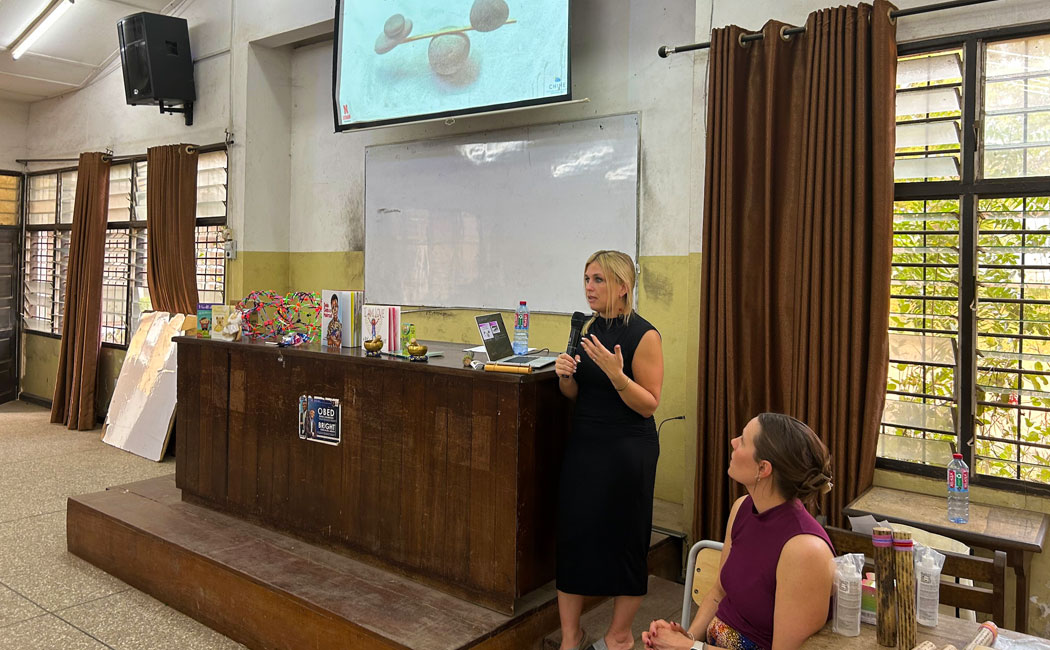
A transformative program designed to help educators use mindfulness and reflection in their daily work is expanding its global reach.
Holly Hatton, associate professor of child, youth and family studies, is collaborating with researchers in Ghana to adapt CHIME — Cultivating Healthy Intentional Mindful Educators — an interactive compassion- and mindfulness-based program developed at the University of Nebraska–Lincoln. The program will support caregivers, young children and college students in the small west African country.
In January, Hatton traveled with UNL graduate research assistants Francisca Lawson Tettevie and Sarah Rasby to Accra, Ghana, where they met with more than 80 early childhood educators at the University of Ghana to conduct professional learning on mindfulness and self-compassion. Surveys from about 60 educators provided valuable insights into CHIME’s potential impact in Ghana.
“Teachers indicated to us that mindfulness and self-compassion are something they are interested in,” Hatton said. “Like American teachers, educators in Ghana are often underpaid and feel undervalued and under-appreciated. But CHIME can be uplifting; it can bring a sense of hope that resonates with teachers.”
CHIME was created in 2017 by Hatton, Nebraska Extension educators and early childhood educators in center-based programs. Offered in-person and online, the program promotes educators’ well-being, giving them strategies to thrive in their roles and build stronger communities.
It provides education and guidance for incorporating mindfulness, self-compassion and reflective practice into educators’ daily routines, teaching and caregiving.
CHIME’s positive impact on Nebraska’s children, families, educators, schools and communities has been significant. More than 500 educators have benefited from engaging in the program, reaching more than 4,500 children statewide. Educators participating in CHIME have scored better than 79% of their peers on measures of mental well-being and 70% of their peers on measures of emotional health.
The program has expanded well beyond Nebraska’s borders and is now being practiced in 14 U.S. states, Brazil and Costa Rica.
The pilot project in Ghana includes 16 faculty and several child care directors. Hatton aims to ultimately include 40 participants, providing content and support to the faculty, who then can share it with their students.
The first step, Hatton said, is to create culturally relevant content that makes sense for teachers in Ghana. She plans to return to Ghana next October for more collaborative content planning.
“The co-learning excites me more than anything,” Hatton said. “We’re learning from one another, creating and fostering relationships with the teachers and faculty who know the importance of mindfulness and compassion. I think it will improve CHIME to make it more relevant and meaningful.”
Lawson Tettevie, who is from Ghana, enjoyed her January visit.
“Traveling back home was not only refreshing to me personally, but also rewarding as an emerging professional and researcher,” she said. “It gave me the opportunity to learn and practice how to build and maintain international collaborations that meet the needs of communities.”
Lawson Tettevie said she was happy she was able to bring some cultural expertise to the initial adaptation process for the training workshop.
“The biggest highlight of this trip was seeing and hearing teachers express how beneficial the training was for them personally and professionally,” she said. “Teachers said they felt seen and supported with strategies and resources on how to ‘be well,’ so they can be better positioned to support the children in their classrooms.”
Learn more about this project in the CYFS Research Network.


